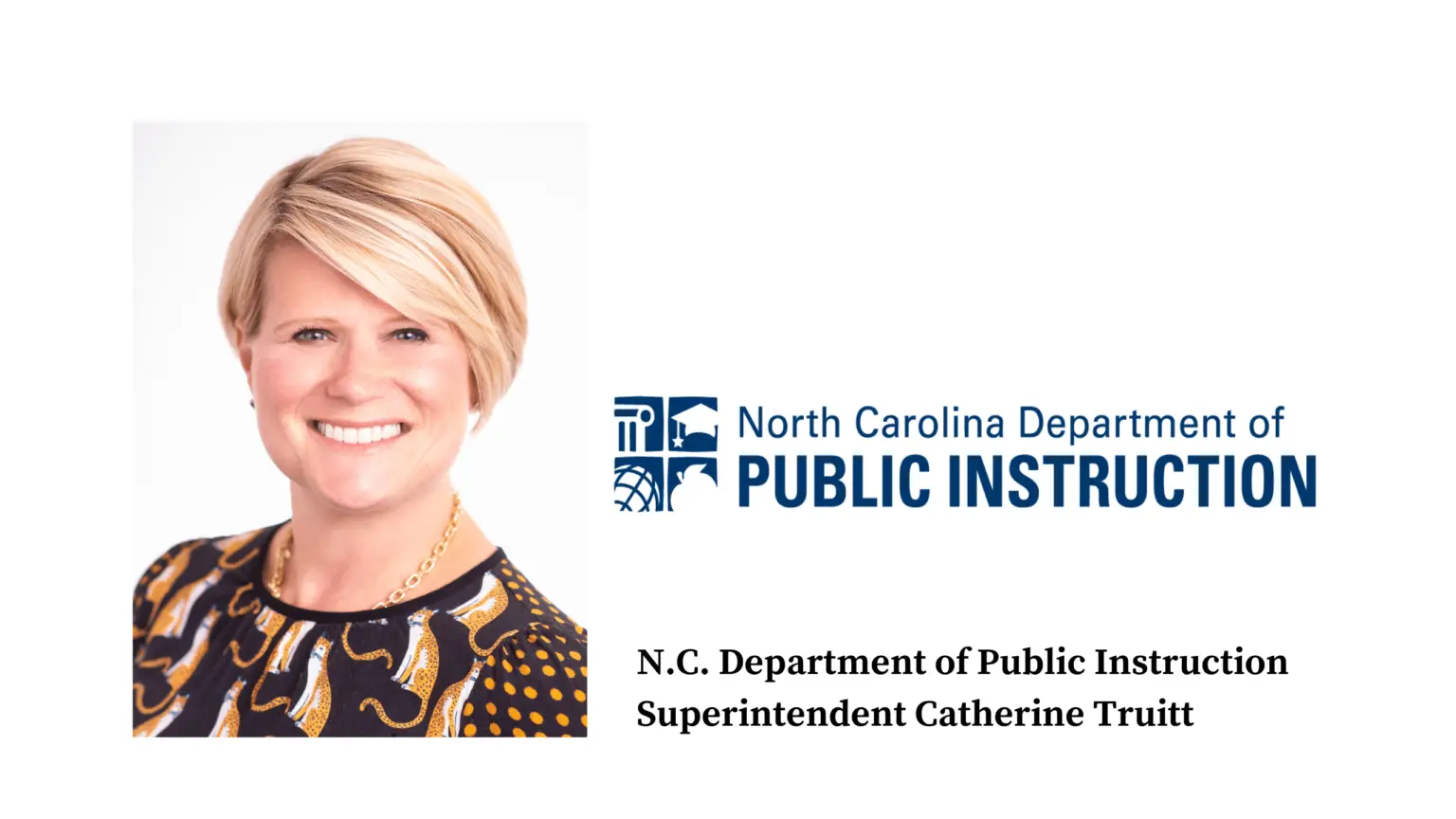Recently, Golden LEAF President, Chief Executive Officer Scott T. Hamilton sat down with North Carolina State Superintendent Catherine Truitt via Zoom and filmed an episode of Critical Conversations. In this series, Scott talks with professionals about economic development issues affecting the state.
Superintendent Truitt has served as the North Carolina State Superintendent of Public Instruction since January 2, 2021.
The North Carolina Department of Public Instruction is charged with implementing the state’s public school laws for pre-kindergarten through 12th grade public schools at the direction of the State Board of Education and the Superintendent of Public Instruction. The North Carolina Department of Public Instruction provides leadership and service to the local public school districts and district public schools, charter schools, and the residential schools for students with hearing and visual impairments.
Superintendent Truitt has been involved with the North Carolina Public school system for years as a teacher, an underperforming schools’ coach, as Governor McCrory’s senior education advisor, and as chancellor of Western Governors University of North Carolina.
The N.C. Department of Public Instruction’s mission is to serve over one and half million public school students, 100,000 teachers, and millions of parents who send their students to our schools every day, said Superintendent Truitt. She also said that we want every student to have access to a highly qualified teacher and we want to lead the charge in bringing solutions to the K-12 system. We want to ensure that our students are workforce ready and that they are prepared for the post-secondary plans of their choice, Superintendent Truitt explained. We want them to be ready after high school or college or the military to compete for high wage, high demand careers.
Part of being a student-centered agency is recognizing that the vast majority of jobs require training and education beyond a K-12 education, Superintendent Truitt said. We are being more intentional about the way we have alignment between K-12 education and our state’s workforce needs. To address the alignment, the Department of Public Instruction has created four Workforce Ready Goals. These goals are to 1) Prepare our future workforce with the skills and experiences required to be successful, productive citizens, providing a robust talent pipeline that powers the State’s economic development efforts; 2) Ensure that all students have access to post-secondary pathways that align with growing, high wage careers and meet local, regional, and/or statewide industry demand for talent; 3) Assist all students and parents in making informed plans and decisions about future education and career opportunities; and 4) Ensure that all students engage in career exploration and real-world learning activities throughout their K-12 journey.
Superintendent Truitt talked about the three phases of the N.C. Department of Public Instruction’s workforce toolkit: explore in elementary school, engage in middle school, and experience in high school. Some of the ways high school students experience workforce readiness is by earning dual high school and college credits, said Superintendent Truitt. Students are also able to participate in work-based learning through job shadowing and internships. Superintendent Truitt also explained that North Carolina schools have robust career and technical education programs with 16 different career clusters with multiple pathways to a career. She added that they are also partnering with the N.C. Business Committee for Education on different needed workforce sectors and support and sponsor 10 pre-apprenticeship programs that are registered with the Apprenticeship N.C.
The North Carolina Community College System is a key partner in developing workforce ready students, said Superintendent Truitt. Some of the ways they support the students in the K-12 system is through the Career and College Promise program, which is free college classes through local community colleges. Superintendent Truitt added that there are also dual enrollment programs through the high school and community college system. She said that Early College programs offer students two years of college while in high school. Superintendent Truitt is also on the nonprofit MyFutureNC Board of Directors. She said that MyFutureNC works to put the N.C. educational goal of having two million North Carolinaians by 2030 with a credential or post-secondary degree in legislation. Superintendent Truitt added that the N.C. Department of Public Instruction has recently completed an articulation agreement to have 53 courses taught in North Carolina high schools that will count toward college credit. To learn more about N.C. Department of Public Instruction and the workforce toolkit, visit https://www.dpi.nc.gov/.
Critical Conversations is a feature in the Golden LEAF newsletter every month. The next edition will be in our July 13th edition of LEAF Lines.

